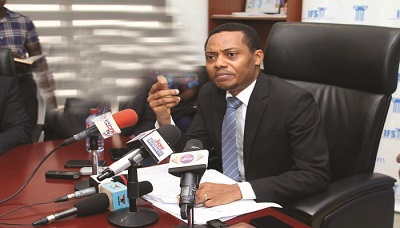
The government must urgently initiate strategies to improve revenue mobilisation to address the worsening public finances and debt, a financial think tank, the Institute for Fiscal Studies (IFS), has said.
According to the think tank the country was in a difficult financial situation due to the government’s inability to mobilise adequate revenue, growing expenditure and extra-budgetary fiscal activities, exacerbating the country’s debt situation, which currently stands at more than GH¢300 billion, representing more than 76 per cent of Gross Domestic Product (GDP).
A Research Fellow of the IFS, Leslie Dwight Mensah, presenting a paper on the “State of Ghana’s Public Finances,” at a forum in Accra on Tuesday said the government revenue had performed poorly for the past eight years, as average growth rate of total government revenue and grants had fallen sharply, both in nominal and real terms.
The forum organised by the IFS was on the topic “Ghana’s Domestic Revenue Mobilisation Woes: How Do We Fix It.?”
He said the average nominal growth fell from 19.9 per cent between 2013-2016 to 14.6 per cent between 2017 and 2020 and the average real growth increased from 3.8 per cent in 2013-2016 to 4.0 per cent between 2017 and 2020.
Mr Mensah said the country’s fiscal deficit was ballooning due to the growing government expenditure.
“Using the latest Gross Domestic Product (GDP) data contained in the 2021 Mid-Year Budget Statement, the official fiscal balance improved from an average deficit of 6.5 per cent of GDP in 2013-2016 to an average deficit of 4.4 per cent of GDP in 2017-2019. In 2020, however, the official fiscal balance spiked to a record deficit of 11.7 per cent of GDP,” he said.
The Research Fellow said Ghana was reeling under severe debt burden, compared with countries such as Japan, Italy, Portugal, UK and China with high debt to GDP.
For instance, Mr Mensah said, Ghana’s debt servicing to revenue stood at 33.2 per cent compared with the 6.9 per cent of UK and 8.9 per cent of Portugal.
“Ghana’s debt service to revenue ratio is alarming despite the debt seeming non-excessive based on the debt to GDP ratio,” he said.
He said two expenditure items, wages and debt servicing were consuming all the country’s tax revenue.
Mr Mensah said wages and debt servicing between 2018 and 2020 constituted 99.7 per cent, 121.4 per cent and 109.4 per cent respectively.
In addition to wages and debt servicing, the Research Fellow said the government had to meet obligations such as transfers to statutory funds, purchase of goods and services, capital expenditure, and arrears clearance.
“Presently, these obligations cannot be met without resorting to borrowing as employee compensation and debt service more than absorb all the available revenue,” Mr Mensah said.
“To cut the excessively high rate of debt service cost and thus enhance public investment for accelerated growth and development, the country’s expenditure, revenue and extra-budgetary issues need to be urgently addressed,” he said.
Among other suggestions, Mr Mensah said, there was the need to make hard choices to realign public spending in favour of public investment by cutting down the rate of growth in expenditure on employee compensation.
He stressed the need for the government to do away with non-essential expenditures to minimise the rate of borrowing.
The Founder of IFS, Dr Kwabena Duffuor, said the “country was in crisis,” and urged all stakeholders including the clergy, chiefs to help address the challenges the country.
BY KINGSLEY ASARE





